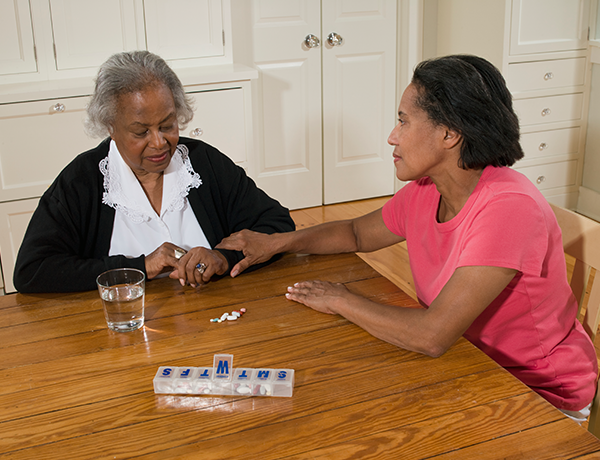National Alzheimer’s Disease Awareness Month

Alzheimer ’s Disease is the most common cause of dementia among older adults. This condition affects not only the millions of Americans who have it, but also family members and those closest to them. Although there is still no cure for Alzheimer’s, research is bringing new insights to light, and potential new treatments are always in development.
For National Alzheimer’s Disease Awareness Month this November, we take a look at the facts of the disease, and also recognize the incredible contributions of family caregivers to their loved ones’ wellness and quality of life.
Alzheimer’s Facts
Although our understanding of Alzheimer’s is still developing, there is much we do know — and more discoveries all the time. Here are some basics about the condition:
- Causes: In Alzheimer’s Disease, the brain experiences changes at a microscopic level, which damage and shrink the organ over a long period of time. These changes are only beginning to be understood by scientists; in fact, definitive diagnosis is not yet possible, and physicians depend on symptoms and tests to better understand a patient’s condition. Aging is frequently a factor in Alzheimer’s onset; more than 90% of patients develop the disease after age 60.
- Symptoms: One of the first areas of the brain to be damaged is where memory is formed, which causes the classic symptom of abnormal forgetfulness. (Contrary to popular belief, memory loss is not a natural part of the aging process.) Other early signs that cognition is diminishing include difficulty finding words, impaired judgment, and problems with vision or spatial recognition.
- Progression: Alzheimer’s is a progressive disease, meaning it gets worse over time. In more advanced stages of the disease, patients may wander or get lost in familiar places, struggle with money management, become confused or frustrated easily, or ask the same question repeatedly. Later developments include difficulty with activities of daily living, such as eating and dressing, and incontinence may become a challenge.
- Treatment: Although this disease cannot be cured, there are treatments available to address some symptoms. For example, numerous drugs have been approved that help some patients’ brains to think and remember better, for longer. Moreover, exercising the brain with puzzles and similar challenges as well as healthy lifestyle choices have shown benefits — or may help delay (or avoid) disease onset altogether. One school of thought is that ‘entering the patient’s reality,’ initiating familiar routines and stirring muscle memory, can help empower him or her to accomplish more. Patients who join clinical trials of Alzheimer’s treatments can help contribute to the search for breakthroughs.
- Care Needs: In the latter stages of Alzheimer’s, patients may grow to need assistance with most or all activities and decision making. The level and duration of care required can be taxing and/or expensive for caregivers to manage, and the emotional and financial strains can even cause the phenomenon of caregiver burnout. This is why self-care and seeking out help and resources is vital to effective caregiving in the long term.
Gifts of Time, Energy, and Care
Hand in hand with Alzheimer’s awareness, November is also National Family Caregivers Month. Caring for a spouse, parent, or other relative to help manage his or her health challenge can require sacrifices of time and energy, including missing work, giving up leisure activities, or letting one’s own health take a back seat. When a family member has Alzheimer’s, caregiving may mean not only adopting new responsibilities, but also adapting to possible changes in a loved one’s expression, comprehension, and behavior. Residential Home Health acknowledges our patients’ families for being exceptional partners in care, and for the extraordinary gifts they provide each day.
No matter what health challenge you or your loved one may be facing, Residential offers a range of services to help patients work toward their health goals safely at home. Call (888)930-WELL (9355) to discuss your specific situation with a Home Care Specialist today, or click here to take our 60-second, 15-question Home Care Assessment.
{{cta(‘b516b1b4-6da9-4cdc-80e0-af320a60aaa8’)}}

